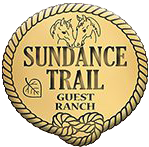University of Nebraska-Lincoln (Copied from The Fence post Breeder’s Collection 2010)
NOTE: You will be asked about this in your interview!
Horses need energy, protein,k vitamins, minerals and roughage, but probably the most overlooked element in horse rations is water, said Gary Stauffer, University of Nebraska-Lincoln Extension Educator in Holt County.
“A good a rule of thumb is that your horse will drink about a gallon of water a day for every hundred pounds of body weight,” Stauffer said. “On a hot summer day, that number might double, but they tend to drink a little bit less in the winter.”
Here at Sundance Trail, we ALWAYS allow horse to drink as much water as they wish – at any time. We NEVER restrict horses’ access to water – EVER. The old rule that cold water can colic a horse is an old wive’s tale! However, a major source of obstructive colic is dehydration! Do NOT let your horse get dry!
He said that the most important thing an owner needs to know about his or her horse is how much it weighs. An idle horse will eat 1-1/2 to 2 percent of its body weight in dry matter per day. Growing horses and lactating brood mares might approach 2-1/1 to 3 percent. Hard-working horses might require 1-3/4 percent to 2-1/2 percent, up to 2 or 3 percent for intense work.
For horse owners who don’t have a scale available, some feed companies have weight tapes that go around the horse’s heart girth, Stauffer said. That’s about where the cinch goes around the saddle, so it would be behind the elbows and over the withers, “just the total circumference around the horse’s barrel.” Stauffer said any tape measure would work.
To figure the horse’s weight, multiply the heart girth in inches times itself. Multiply that number by the body length in inches, from the point of the shoulder horizontally to the rear of the quarter, and divide by 330. The result will be the horse’s approximate weight in pounds.
“So it’s heartgirth times heartgirth times body length divided by 330,” Stauffer said.
Once the owner knows the horse is getting enough food, the next question is whether it’s the right kind. Horses need protein, energy, vitamins and minerals in their rations, Stauffer said. Energy is fuel for the horse. Protein build bones and muscles and tissues. Minerals, too, are especially important for bone growth.
To determine if the horse is getting an appropriate ration, monitor its body condition. Horses are scored from one to nine. Ones are very thin. Nines are very obese. Horses should be in the middle at about a five. You ought to be able to feel a horse’s ribs with your fingers, but not be able to see its ribs with your eyes.
Protein is the most expensive thing in horse rations, so keep that level just at the point where it meets all the requirements, but doesn’t exceed them a lot. Protein, if fed to excess, is converted into energy and that’s a very expensive form of energy. If the horse is used for very strenuous events, the process of breaking down protein creates body heat, which is a disadvantage to an athlete.
The most important minerals to consider are calcium and phosphorus. If they’re deficient, the horse will have poor feet, legs and bone structure. Calcium should be higher in the ratio than phosphorus.
Horses also need salt. Stauffer advised free-choice salt or maybe a trace-mineralized salt.
A lot of times, horses can live on roughage alone. Stauffer said that people tend to feed more grain than horses need. A good rule of thumb is at least 50 percent of the horse’s ration ought to be roughage. A hard-working horse might need some grain in its ration, but horses should receive at least 1 percent of their body weight in roughage every day.
Dude Ranch Horse
Practice Problem:
Measure horse from point of chest to point of croup in inches (length of horse).
Measure horse’s circumference or heartgirth in inches.
Calculate weight by the following: (heartgirth x heartgirth x length/300) + 50 = weight.
Example:
If the Heartgirth is 70″ and the Length is 65″
Step #1: 70″ x 70″ x 65″ = 318,000
Step #2: Divide 318,000 by 300 = 1061.6
Step #3: Then 1061.6 + 50 = 1111.6
Horse weighs approximately 1111 pounds (plus or minus 3%)
